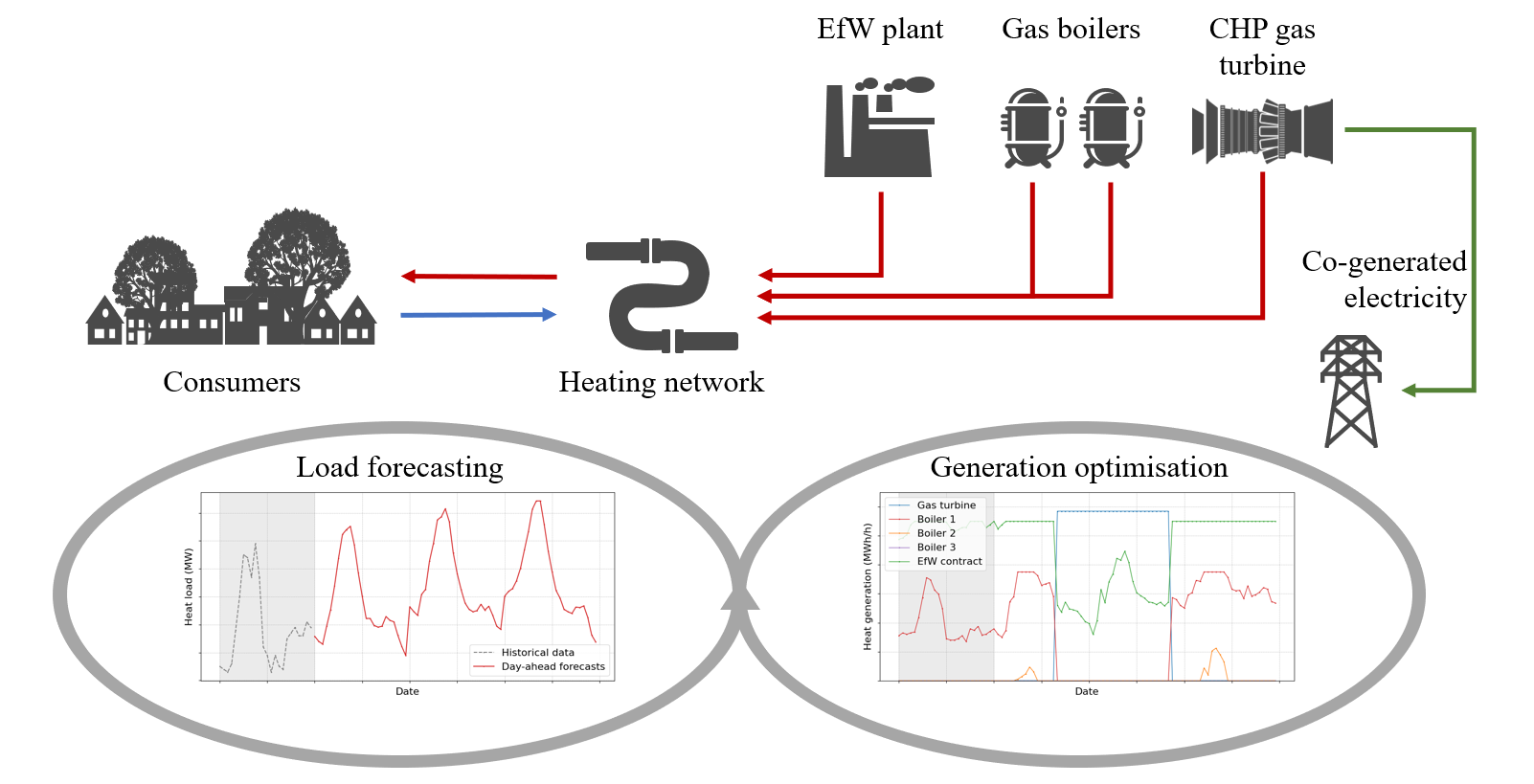Technical Report 275, c4e-Preprint Series, Cambridge
Sustainable operation of district heating systems using dynamic hierarchical optimisation
Reference: Technical Report 275, c4e-Preprint Series, Cambridge, 2021
Associated Themes:

Highlights
- Developed an MPC framework to optimise heat generation for a district heating network.
- Identified key cost drivers using a detailed sensitivity analysis.
- Developed high accuracy time series forecasting models for key input variables.
- Assessed improvement potential based on actual data from a municipal utility.
- Identified approximately 20% and 40% reduction potential for generation cost and CO2 emissions, respectively.
Abstract
 Resource-optimised management of district heating networks needs to consider a wide range of factors, including demand forecasting, flexibility of the heat provision mix, and volatile market conditions. While traditional approaches often rely on static models and rather simple heuristics, dynamic cross-domain interoperability that allows the consideration of all these factors is essential to holistically optimise thermal grid operations. This paper demonstrates a proof-of-concept for a knowledge graph-based optimisation problem to minimise total heat generation cost for a district heating provider. The optimisation follows a hierarchical approach based on a merit-order principle and is embedded in a model predictive control (MPC) framework to allow the system to incorporate most recent information and react to disturbances promptly. A detailed sensitivity study is conducted to identify key design criteria and input parameters. Simulation-based optimisation is used to determine the short-term heat generation mix based on data-driven gas consumption models and day-ahead forecasts for the network’s energy demand and grid temperatures. The proposed forecasting models deliver reliable and accurate predictions without any noteworthy difference in generation optimisation results when evaluated for forecasted versus actual historical values. The effectiveness of the approach is demonstrated for an existing heating network of a midsize city in Germany, where a reduction of approximately 20% in operating cost and approximately 40% in CO2 emissions is obtained compared to baseline operational data.
Resource-optimised management of district heating networks needs to consider a wide range of factors, including demand forecasting, flexibility of the heat provision mix, and volatile market conditions. While traditional approaches often rely on static models and rather simple heuristics, dynamic cross-domain interoperability that allows the consideration of all these factors is essential to holistically optimise thermal grid operations. This paper demonstrates a proof-of-concept for a knowledge graph-based optimisation problem to minimise total heat generation cost for a district heating provider. The optimisation follows a hierarchical approach based on a merit-order principle and is embedded in a model predictive control (MPC) framework to allow the system to incorporate most recent information and react to disturbances promptly. A detailed sensitivity study is conducted to identify key design criteria and input parameters. Simulation-based optimisation is used to determine the short-term heat generation mix based on data-driven gas consumption models and day-ahead forecasts for the network’s energy demand and grid temperatures. The proposed forecasting models deliver reliable and accurate predictions without any noteworthy difference in generation optimisation results when evaluated for forecasted versus actual historical values. The effectiveness of the approach is demonstrated for an existing heating network of a midsize city in Germany, where a reduction of approximately 20% in operating cost and approximately 40% in CO2 emissions is obtained compared to baseline operational data.
Material from this preprint has been published in Applied Energy.




